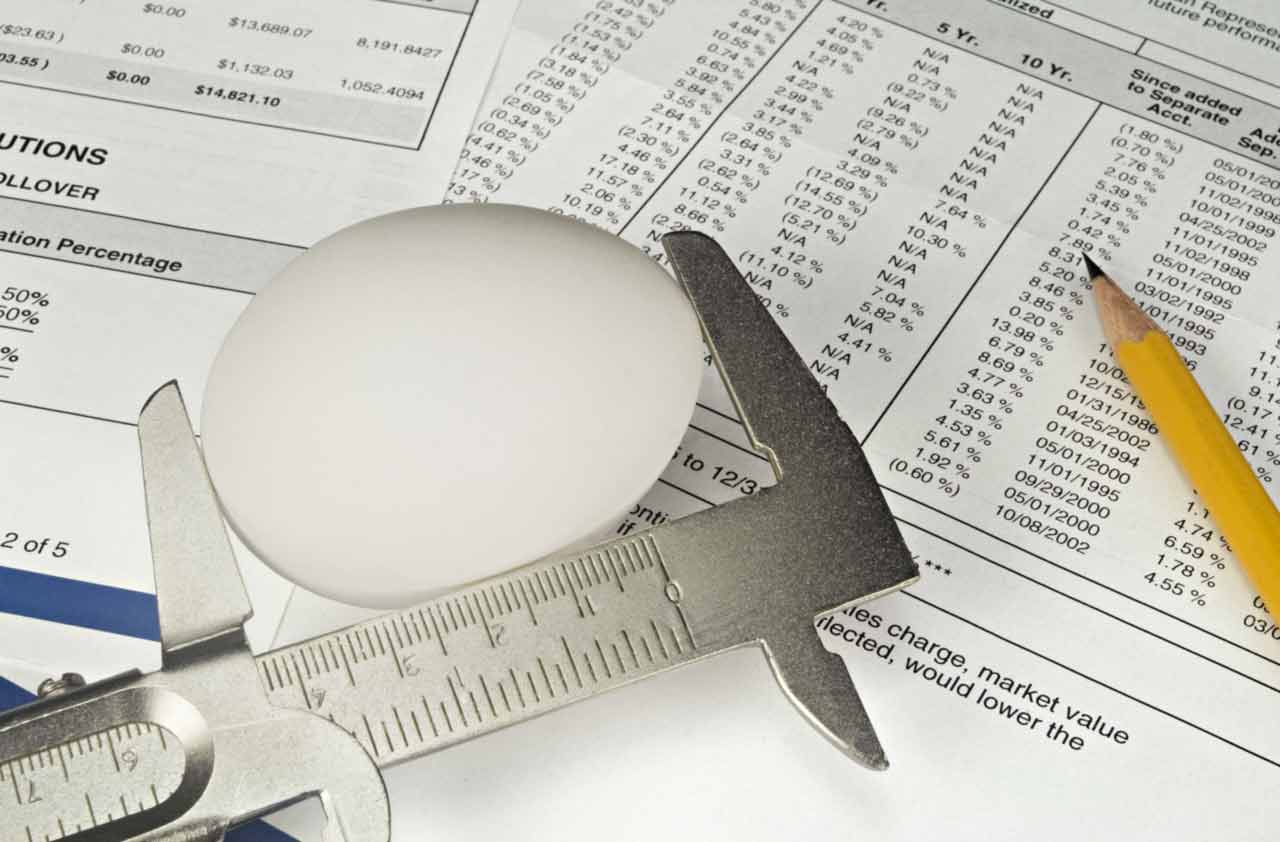How Should YOU Measure Your Investment Performance?
Investors shouldn't be obsessed with their portfolio's performance, but an annual evaluation is key to keeping you on track.


Profit and prosper with the best of Kiplinger's advice on investing, taxes, retirement, personal finance and much more. Delivered daily. Enter your email in the box and click Sign Me Up.
You are now subscribed
Your newsletter sign-up was successful
Want to add more newsletters?

Delivered daily
Kiplinger Today
Profit and prosper with the best of Kiplinger's advice on investing, taxes, retirement, personal finance and much more delivered daily. Smart money moves start here.

Sent five days a week
Kiplinger A Step Ahead
Get practical help to make better financial decisions in your everyday life, from spending to savings on top deals.

Delivered daily
Kiplinger Closing Bell
Get today's biggest financial and investing headlines delivered to your inbox every day the U.S. stock market is open.

Sent twice a week
Kiplinger Adviser Intel
Financial pros across the country share best practices and fresh tactics to preserve and grow your wealth.

Delivered weekly
Kiplinger Tax Tips
Trim your federal and state tax bills with practical tax-planning and tax-cutting strategies.

Sent twice a week
Kiplinger Retirement Tips
Your twice-a-week guide to planning and enjoying a financially secure and richly rewarding retirement

Sent bimonthly.
Kiplinger Adviser Angle
Insights for advisers, wealth managers and other financial professionals.

Sent twice a week
Kiplinger Investing Weekly
Your twice-a-week roundup of promising stocks, funds, companies and industries you should consider, ones you should avoid, and why.

Sent weekly for six weeks
Kiplinger Invest for Retirement
Your step-by-step six-part series on how to invest for retirement, from devising a successful strategy to exactly which investments to choose.
I’ve spent over 25 years in the financial advisory profession but recently had a startling realization about investment performance. During a friendly debate with a friend who manages a small-cap mutual fund, I realized even seasoned investment professionals can have misperceptions about investment performance. My friend had a fixation on top quartile performance, a key measure of his professional ranking, but one with little application in the real world — where clients typically own mutual funds representing various asset classes.
Our debate got me to thinking: How should the average investor measure investment performance? I recommend investors focus on two components of performance:
How is my performance number calculated?
From just $107.88 $24.99 for Kiplinger Personal Finance
Become a smarter, better informed investor. Subscribe from just $107.88 $24.99, plus get up to 4 Special Issues

Sign up for Kiplinger’s Free Newsletters
Profit and prosper with the best of expert advice on investing, taxes, retirement, personal finance and more - straight to your e-mail.
Profit and prosper with the best of expert advice - straight to your e-mail.
How is my account doing relative to a fair benchmark?
Your Performance Calculation
The performance calculation methodology involves two key variables: 1) the mathematical formula used to produce a return figure and 2) the portfolio(s) that are being measured. Most professional money managers use a Global Investment Performance Standards (GIPS) compliant methodology to calculate investment performance. Brokers, Registered Investment Advisers and custodians often provide performance information to clients in their account statements. It is important to ask your provider if their performance report uses an approved GIPS methodology. Time-weighted returns are the most commonly used measure.
Interestingly, GIPS does not require investment performance to be reported net of fees. Consumers would be wise to ask their adviser for performance reports net of fees. After all, it’s not what you earn, it’s what you keep that is important.
Equally important is understanding whether the performance number is specific to your account, or merely a listing of the performance of each mutual fund. According to the GIPS guidance statement on fees, “The GIPS standards are based on the concept of presenting composite performance to prospective clients rather than presenting individual portfolio returns to existing clients (emphasis added).” Very simply, it is permissible for a broker or custodian to show a performance number on your statement for XYZ mutual fund that may or may not be your actual investment performance.
I’ve seen brokerage statements list a client’s various mutual fund’s performance, but not include the client’s overall account performance. Investors should ask their adviser for their specific account’s performance net of all fees. Most advisers have software that can calculate this.
Which Benchmark to Use
What about benchmarks? How can investors gauge their performance relative to other alternatives? This simple question raises many issues.
Should you benchmark your portfolio versus an index like the S&P 500? What’s a fair comparison for a portfolio invested 65% equity / 35% fixed? What about an all-equity portfolio comprised of large-cap, small-cap, international, REITs and emerging markets?
Morningstar provides a quarterly list of average returns by category, which is a reasonable basic benchmark to measure a specific fund. For accounts using a diversified, multiple asset class approach, Morningstar provides returns for different asset allocation funds, sorted by equity ranges. This is a helpful guide should your portfolio be comprised of large-cap, small-cap, international and emerging market funds.
The Bottom Line
While an obsession with performance can be counterproductive (often leading to chasing past winners and inferior performance), an annual review of portfolio performance is something all investors should undertake. Make sure you understand what is being measured and how it is being measured so you can track progress toward your goals.
Profit and prosper with the best of Kiplinger's advice on investing, taxes, retirement, personal finance and much more. Delivered daily. Enter your email in the box and click Sign Me Up.

Mike Palmer has over 25 years of experience helping successful people make smart decisions about money. He is a graduate of the University of North Carolina at Chapel Hill and is a CERTIFIED FINANCIAL PLANNER™ professional. Mr. Palmer is a member of several professional organizations, including the National Association of Personal Financial Advisors (NAPFA) and past member of the TIAA-CREF Board of Advisors.
-
 Quiz: Do You Know How to Avoid the "Medigap Trap?"
Quiz: Do You Know How to Avoid the "Medigap Trap?"Quiz Test your basic knowledge of the "Medigap Trap" in our quick quiz.
-
 5 Top Tax-Efficient Mutual Funds for Smarter Investing
5 Top Tax-Efficient Mutual Funds for Smarter InvestingMutual funds are many things, but "tax-friendly" usually isn't one of them. These are the exceptions.
-
 AI Sparks Existential Crisis for Software Stocks
AI Sparks Existential Crisis for Software StocksThe Kiplinger Letter Fears that SaaS subscription software could be rendered obsolete by artificial intelligence make investors jittery.
-
 Social Security Break-Even Math Is Helpful, But Don't Let It Dictate When You'll File
Social Security Break-Even Math Is Helpful, But Don't Let It Dictate When You'll FileYour Social Security break-even age tells you how long you'd need to live for delaying to pay off, but shouldn't be the sole basis for deciding when to claim.
-
 I'm an Opportunity Zone Pro: This Is How to Deliver Roth-Like Tax-Free Growth (Without Contribution Limits)
I'm an Opportunity Zone Pro: This Is How to Deliver Roth-Like Tax-Free Growth (Without Contribution Limits)Investors who combine Roth IRAs, the gold standard of tax-free savings, with qualified opportunity funds could enjoy decades of tax-free growth.
-
 One of the Most Powerful Wealth-Building Moves a Woman Can Make: A Midcareer Pivot
One of the Most Powerful Wealth-Building Moves a Woman Can Make: A Midcareer PivotIf it feels like you can't sustain what you're doing for the next 20 years, it's time for an honest look at what's draining you and what energizes you.
-
 I'm a Wealth Adviser Obsessed With Mahjong: Here Are 8 Ways It Can Teach Us How to Manage Our Money
I'm a Wealth Adviser Obsessed With Mahjong: Here Are 8 Ways It Can Teach Us How to Manage Our MoneyThis increasingly popular Chinese game can teach us not only how to help manage our money but also how important it is to connect with other people.
-
 Looking for a Financial Book That Won't Put Your Young Adult to Sleep? This One Makes 'Cents'
Looking for a Financial Book That Won't Put Your Young Adult to Sleep? This One Makes 'Cents'"Wealth Your Way" by Cosmo DeStefano offers a highly accessible guide for young adults and their parents on building wealth through simple, consistent habits.
-
 Global Uncertainty Has Investors Running Scared: This Is How Advisers Can Reassure Them
Global Uncertainty Has Investors Running Scared: This Is How Advisers Can Reassure ThemHow can advisers reassure clients nervous about their plans in an increasingly complex and rapidly changing world? This conversational framework provides the key.
-
 I'm a Real Estate Investing Pro: This Is How to Use 1031 Exchanges to Scale Up Your Real Estate Empire
I'm a Real Estate Investing Pro: This Is How to Use 1031 Exchanges to Scale Up Your Real Estate EmpireSmall rental properties can be excellent investments, but you can use 1031 exchanges to transition to commercial real estate for bigger wealth-building.
-
 Should You Jump on the Roth Conversion Bandwagon? A Financial Adviser Weighs In
Should You Jump on the Roth Conversion Bandwagon? A Financial Adviser Weighs InRoth conversions are all the rage, but what works well for one household can cause financial strain for another. This is what you should consider before moving ahead.